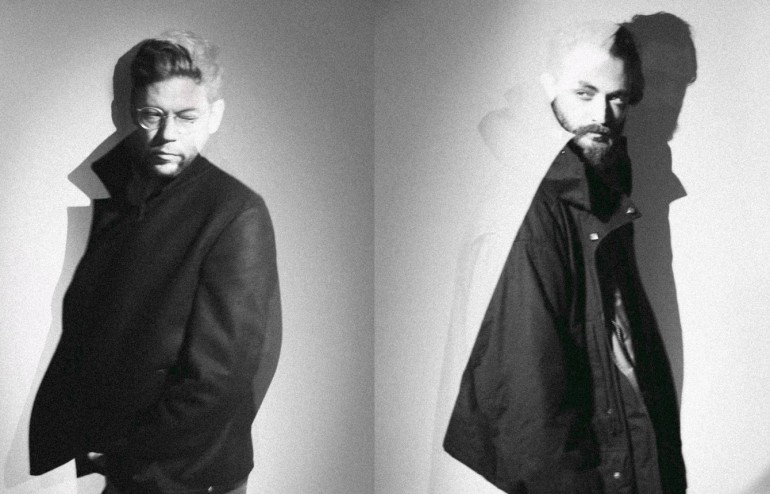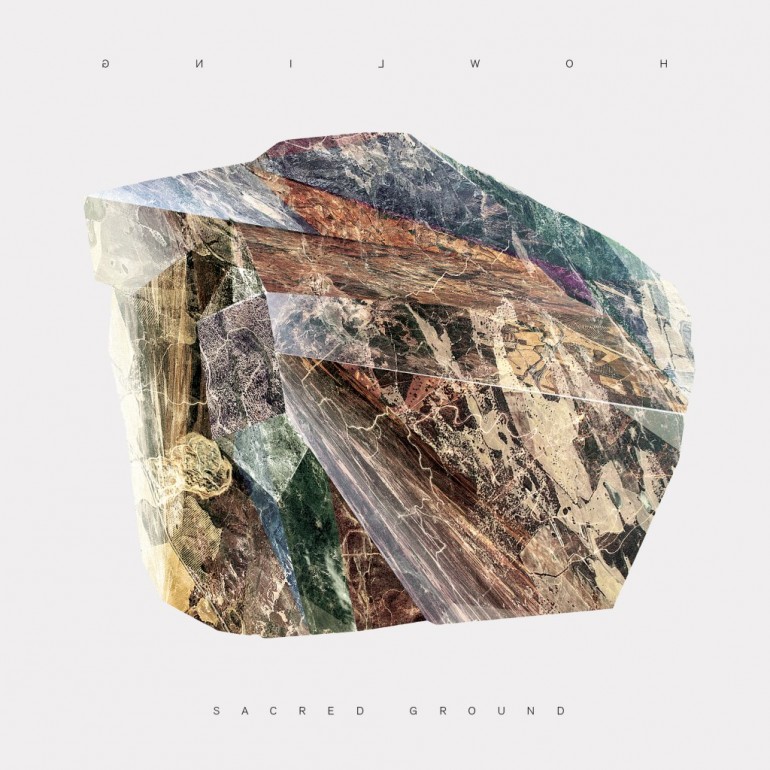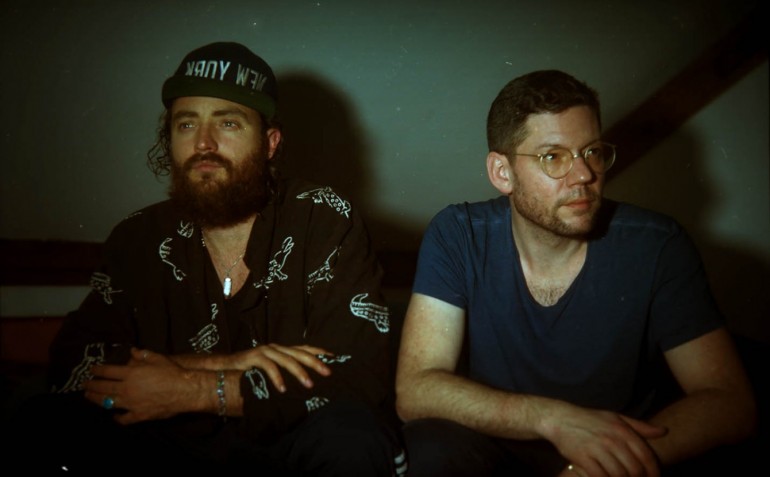
Photo by Michael Mann
It feels like RY X and FRANK WIEDEMANN understand each other even without using many words. The two musicians – who together form the tender techno duo HOWLING – complete each others sentences and kid around during NOTHING BUT HOPE AND PASSION’s rewarding interview with them. Besides, the two friendly guys (who just released their debut record Sacred Ground) seem to supplement each other perfectly. Not only musically but also on the human level: RY X takes over the spiritual and reflective part and FRANK WIEDEMANN the straighter and clearer one. In the context of this year’s Electronic Beats Festival in Cologne we got the chance to have an enriching chat with the likeable duo about its unique collaboration.
What’s that Sacred Ground your album is named after? Or better, what’s your Sacred Ground?
Ry: What’s your sacred ground, Frank?
Frank: Bodensee.
Ry: Bodensee.
Frank: Actually all the places we recorded the songs were kind of our Sacred Ground. All songs have been recorded in different places and occasions. When we’ve been on tour or in cafés or whatever. And yes it’s this kind of special energy in all this places.
Ry: You know, I have to think of connections. Different parts of myself are connected to different landscapes. I obviously love Frank’s farm at the Bodensee, California where I’m living at the moment and Berlin… It was really about paying homage to the places and the influences on us. It wasn’t about the favourite, it was the fact that each place had a different reflection of us and we made different music in every place. And they were all special places so they became sacred to us.
How does it come that two persons from the first view coming from such musically different styles make music together?
Ry: It’s kismet maybe. Kismet you know.
Frank: The universe wanted us to be together.
Ry: Yeah, maybe. You start to sound like me, Frank. (laughs) I don’t think that there is necessarily always a specific reasoning. Frank and I have a very close understanding of music. We both see the same way about music. And so that allowed us to speak the same language.
What kind of way is that?
Ry: Sincere. I think very about the sound, about the moment. Not about thinking about if it’s going to be popular or what kind of audience it is for. It’s just about capturing the essence of what it is.
Frank: We also figured out that we had a lot of same influences in making our own solo music. But actually how it comes that we listen to the same music but do different music in the end is interesting and then putting that together is also pretty interesting.
And which influences do you share?
Ry: So much stuff.
Frank: From Modern Classic, to African, to Indian music…
Ry: Yeah, we have like so many of the same influences.
Was it hard for you to find this intersection between your musical styles? Probably house and pop music?
Ry: No, it wasn’t hard at all. It was very natural. I mean like Frank just said it, our music influences are so wide. So when I was talking to Frank about an African rhythm he just knew it instantly. And when I’m talking about: Oh it would be so nice if we would do this partitive, beautiful thing with tension he knew what I meant as well. So we understand the same things. In terms of us playing music together it was quite easy, it still is very easy. I don’t know if we’ve even explored the boundaries yet. Because we did it in a certain way on this record but even the way we’re talking about doing maybe the next musical part together is in a different way. It’s gonna be a new exploration. But it’s kind of limitless. That’s the cool thing with Frank. Like we could have made forty tracks for this album if we would have time. But I think when we get together we can make music. Actually I never thought about that Frank. It’s pretty rare. Normally you burn out at a certain point but with Frank I feel like we’ve barely scratched it.
Frank: At one day in England, where we recorded Signs, the song. At that day we made three tracks… There is only one which made it onto the album but there is one techno track at one really weird electronic track.
Ry: We just create and create without boundaries and then you see where it ends up. I’m really excited about the next thing actually. I think we should maybe stop touring and just record.
Frank: It’s beautiful to tour and to play the music for the people of course because you have this reaction, this feedback. But it’s so nice to be in the studio and just crazy.
Ry: People allow you to tour. It’s part of the whole process to have like three weeks one the road, to play these festivals, do this and do that. But the way the industry is structured doesn’t have a lot respect for something like: ‘Oh you guys want to have three weeks in the studio together? Oh yeah sure. We won’t email you for three weeks.’ It’s not like that. We have so much business now in our lives that it’s hard to find the time. But I think that we should take these three weeks.
Frank: Yeah, just stop touring for three weeks.
“It’s kind of limitless”
So do you prefer the stage or the studio?
Ry: They are really different. In the studio you can be an introvert which is actually what I am. But in this context you’re forced to be an extrovert. You’re forced to be in front of people, which is nice but sometimes you just don’t feel like it.
Frank: During the shows you can be very flexible on stage. You can play every song each time different or even go pretty wild at some points. And it makes it of course interesting again because then you’re in a kind of new situation because you communicate with each other and you can try out something new.
So there is improvisation going on on stage?
Frank: Not everything, but there is a lot of freedom.
Ry: There are moments we have. We play a song and then at a certain moment we all know that we have freedom and we explore that freedom for like five minutes. And then we look at each other and know that it’s time to end and we end the song.
Was it hard for you to transfer your music on stage?
Ry: Hard is an interesting word because it wasn’t hard emotionally. We didn’t not wanna do it. But it was difficult. It takes a lot of time and energy to take something that you have recorded in the studio and find out how to play it live. And I got in Jens who became part of the project a few years ago in the live-format and he’s been crucial ‘cause there is three of us, so we can do a lot more. But it’s endless, you know. We could get an orchestra; we always plan these things. We’ve both done little things, we heard about the Berlin ballet and go like: Oh let’s write music about the Berlin ballet and make this live score to this.
Frank: I mean the problem is always the financial limitations. Travelling with the band is so much effort. But we’re happy now that we have the light guys with us.
Ry: To invest in lights, in a live show, to invest in…’cause there is so much more. You have the sound guy, you’ve got to bring your own desk, everything. So it takes so much effort to make it sound the way we want it to sound. But we’re getting there.
You’re lyrics seem to be quite abstract and tentative applied. What’s your intention behind that? And what’s inspiring you to write them?
Ry: Well, I don’t write lyrics …
Frank: It’s me, I write them. (laughing)
Ry: I don’t write lyrics to be obvious. I’m not trying to tell a love story to somebody. But I’m talking about something really personal. So what might seem abstract to somebody else is quite literal to me. You know classic things like in HOWLING when people send me photos of them with their lyrics tattooed on them…
Really?
Ry: Yeah, they send me videos of them at weddings when they’re walking down the altar and I’m going: You don’t know what’s the song about, I don’t think you’re wanting to get married to it ‘cause it’s really about sex and other things and I’m not sure that it’s appropriate for the moment of your life love and union with the minister and god watching over you. I mean lyrics are a personal thing, you don’t write lyrics for anybody else. Pop-writers write lyrics for everybody else but that to me is abstract. To write: ‘Oh she left and my heart is broken.’ You know, that’s abstract ‘cause it’s not telling the truth. It’s not telling the individual story. The individual story might seem abstract from the outside but it’s very poignant actually.
Frank: Poignant?
Ry: To the point of the moment. I’m teaching him English. (laughs)
Frank: I’m still learning.
“We are like mirrors to each other”
How do your songs emerge? Do you have like a session in the studio or…?
Ry: Well, the way that the songs come about is everything is a studio. That’s the reality. Like we go on stage and we’re supposed to be sound-checking but we’re writing a song and that becomes the studio. And we recorded somewhere and later on we come and revisit that. It’s not so much that we plan the studio-sessions, they just happen. We were at the Bodensee at a farm and we only got one microphone and …
Frank: Wanna here a new track? (taking his phone and playing out some tones)
Ry: Oh yeah, we recorded this today here on the stage, I just improvised.
Frank: I felt like I needed to record this.
Ry: So we have that kind of moments at that’s actually what Sacred Ground is made up of. Some very structured songs like Howling or maybe Shortline a little bit more and then the freedom of Lullaby or Zurich and even Forest a little bit. They just happen. We don’t try to focus so much on how our process is. We don’t have a process, we just do it. Maybe in a few years it will become a process and we have to break it apart again. But I think what’s beautiful is that we kind of have an anti-process at the moment.

HOWLING’S debut album ‘Sacred Ground’
I bought the vinyl version of your record and there are these stones everywhere. For every song a different one. What do these stones mean to you?
Ry: Well, this sacredness of crystals. It’s like the entity of broken down trees, the history of past of the earth compressed and it becomes this beautiful thing. You got millions of years of information and live compressed in. And suddenly instead of dirt it’s a crystal. How crazy and beautiful that is alone?! And so it is a little bit like the story of creating this songs. We have all these influences and all these experiences in your life. You know, travelling, love and heart-breaking. Everything you’re going through and growing to spiritually, individually… And it gets compressed into this thing and it becomes a song. So we had a little crystal for every song. And that represents it. An artist friend of ours, Coco from Vienna, he made these crystals for us. It became kind of our emblem in our story.
Frank: We’ve been talking with him a lot about how it should look and we explained him the story how we created these songs and explained the title. And so he came up with this idea of crystals.
And why are the lyrics mirror-inverted?
Frank: It’s self-reflected.
Ry: Yeah, it’s self-reflective. There is not just this obvious thing. And actually he didn’t know about this, but when I was a kid I loved Leonardo DaVinci. He actually wrote everything backwards. All of his ideas, all of his paintings, all of his inventions. He invented so many things and he wrote it backwards so nobody could read it. And then the church found him and thought that it was like the devils’ script or something but he realised that he could hold in in a mirror and read it. So this is this idea of ‘mirrorship’.
Frank: We are like mirrors to each other.
“Everything has a purpose and a point”
So I guess that visualisation also plays an essential part in your shows?
Ry: Yeah, a huge one. We have friends of ours who have done like a light installation scenography. Frank already mentioned the children of light from Amsterdam and they spent months hand building lamps, hand building these beautiful lightning rigs and we don’t just say: Oh make some light. We talked about James Tarell who’s an amazing visual light artist that I loved. We talked about perspective and challenging the eye and playing with the environment. Everything has a purpose and a point.
You’re curating your own festival in Berlin on July 11, called ‘Sacred Ground‘. What’s your idea behind it?
Frank: We have so many friends who are doing amazing music and we wanted to get them together in a beautiful space. We found this little farm and it fits about 800 people I guess.
Ry: I think it could fit more but we’re gonna keep it very small.
Frank: It’s kind of born in the idea that we all have this different projects: I do ÂME and SCHWARZMANN and he does THE ACID and his solo stuff and then we do HOWLING. And I think these kind of constellations are unique and all the label managers are hating us for doing this because it hard to sell. But we love this fact. I love the THE ACID album and he likes what I’m doing. It’s about this togetherness in a way.
Ry: We have different people from different parts, it’s our own line-up. Festivals at the moment are so curated and it’s just like a model. Oh what kind of crap, electronic. What kind of electronic? This kind of electronic. So it’s kind of like let’s book this people. I think what’s really nice about what we’re trying to do is create some freedom, create a little bit of unknown. Even for ourselves.
Frank: Different styles.
Ry: Yeah, we don’t know. We are talking about the idea that maybe I come on and play a set at sunrise instead of 6pm when everybody’s supposed to play music. Maybe its Frank playing an ÂME live set until the sun comes up and then I walk on stage with a guitar and the sun is rising and do a RY X solo set. Challenge the whole thing. Just to try it. We don’t know what will happen.
—




